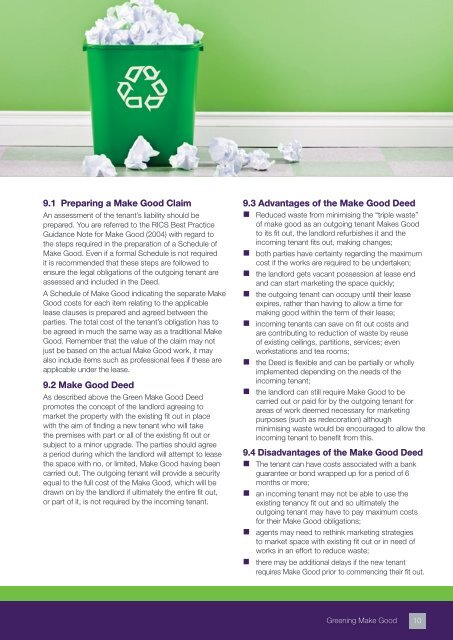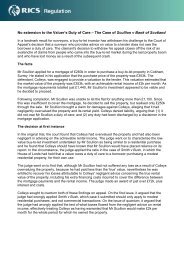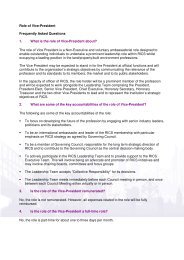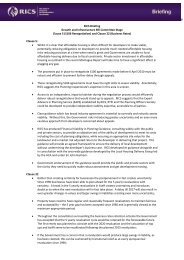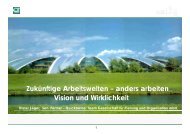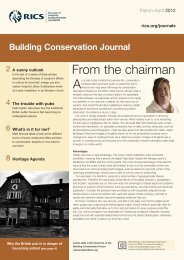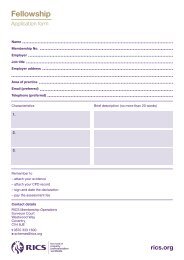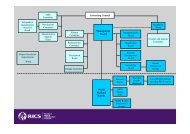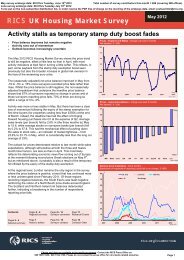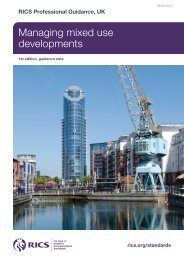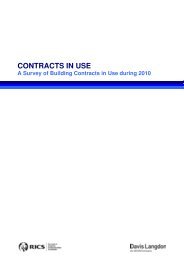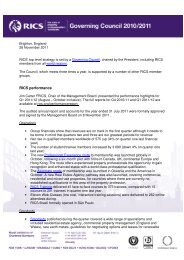You also want an ePaper? Increase the reach of your titles
YUMPU automatically turns print PDFs into web optimized ePapers that Google loves.
9.1 Preparing a <strong>Make</strong> <strong>Good</strong> Claim<br />
An assessment of the tenant’s liability should be<br />
prepared. You are referred to the <strong>RICS</strong> Best Practice<br />
Guidance Note for <strong>Make</strong> <strong>Good</strong> (2004) with regard to<br />
the steps required in the preparation of a Schedule of<br />
<strong>Make</strong> <strong>Good</strong>. Even if a formal Schedule is not required<br />
it is recommended that these steps are followed to<br />
ensure the legal obligations of the outgoing tenant are<br />
assessed and included in the Deed.<br />
A Schedule of <strong>Make</strong> <strong>Good</strong> indicating the separate <strong>Make</strong><br />
<strong>Good</strong> costs for each item relating to the applicable<br />
lease clauses is prepared and agreed between the<br />
parties. The total cost of the tenant’s obligation has to<br />
be agreed in much the same way as a traditional <strong>Make</strong><br />
<strong>Good</strong>. Remember that the value of the claim may not<br />
just be based on the actual <strong>Make</strong> <strong>Good</strong> work, it may<br />
also include items such as professional fees if these are<br />
applicable under the lease.<br />
9.2 <strong>Make</strong> <strong>Good</strong> Deed<br />
As described above the Green <strong>Make</strong> <strong>Good</strong> Deed<br />
promotes the concept of the landlord agreeing to<br />
market the property with the existing fit out in place<br />
with the aim of finding a new tenant who will take<br />
the premises with part or all of the existing fit out or<br />
subject to a minor upgrade. The parties should agree<br />
a period during which the landlord will attempt to lease<br />
the space with no, or limited, <strong>Make</strong> <strong>Good</strong> having been<br />
carried out. The outgoing tenant will provide a security<br />
equal to the full cost of the <strong>Make</strong> <strong>Good</strong>, which will be<br />
drawn on by the landlord if ultimately the entire fit out,<br />
or part of it, is not required by the incoming tenant.<br />
9.3 Advantages of the <strong>Make</strong> <strong>Good</strong> Deed<br />
Reduced waste from minimising the “triple waste”<br />
of make good as an outgoing tenant <strong>Make</strong>s <strong>Good</strong><br />
to its fit out, the landlord refurbishes it and the<br />
incoming tenant fits out, making changes;<br />
both parties have certainty regarding the maximum<br />
cost if the works are required to be undertaken;<br />
the landlord gets vacant possession at lease end<br />
and can start marketing the space quickly;<br />
the outgoing tenant can occupy until their lease<br />
expires, rather than having to allow a time for<br />
making good within the term of their lease;<br />
incoming tenants can save on fit out costs and<br />
are contributing to reduction of waste by reuse<br />
of existing ceilings, partitions, services; even<br />
workstations and tea rooms;<br />
the Deed is flexible and can be partially or wholly<br />
implemented depending on the needs of the<br />
incoming tenant;<br />
the landlord can still require <strong>Make</strong> <strong>Good</strong> to be<br />
carried out or paid for by the outgoing tenant for<br />
areas of work deemed necessary for marketing<br />
purposes (such as redecoration) although<br />
minimising waste would be encouraged to allow the<br />
incoming tenant to benefit from this.<br />
9.4 Disadvantages of the <strong>Make</strong> <strong>Good</strong> Deed<br />
The tenant can have costs associated with a bank<br />
guarantee or bond wrapped up for a period of 6<br />
months or more;<br />
an incoming tenant may not be able to use the<br />
existing tenancy fit out and so ultimately the<br />
outgoing tenant may have to pay maximum costs<br />
for their <strong>Make</strong> <strong>Good</strong> obligations;<br />
agents may need to rethink marketing strategies<br />
to market space with existing fit out or in need of<br />
works in an effort to reduce waste;<br />
there may be additional delays if the new tenant<br />
requires <strong>Make</strong> <strong>Good</strong> prior to commencing their fit out.<br />
<strong>Greening</strong> <strong>Make</strong> <strong>Good</strong> 10


